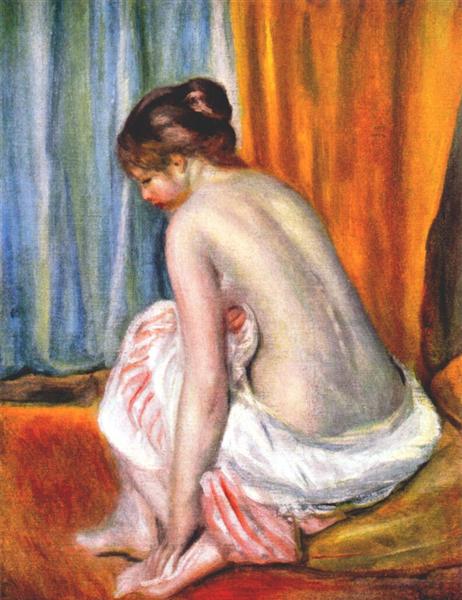Beschreibung
“The Rear View of a Bather,” a work created in 1893 by Pierre-Auguste Renoir, is a faithful reflection of the French painter’s mastery in capturing light, movement and sensuality through his vibrant palette and impressionist technique. This painting is at the intersection of the seemingly simple and the inherently complex, since, although it portrays a human figure in a contemplative posture, it accurately reflects the style and essence of the period in which it was created.
The composition of the work focuses on the figure of a woman from behind, whose elegant beauty and nudity celebrate the feminine form. The figure is placed in the foreground, while the background is marked by a beautiful waterscape that shimmers in the light. The way Renoir positions the bather at the lower end of the painting provides a sense of depth, as well as making the viewer focus on the details of her body and the fluidity that emanates from her relaxed posture. The choice to depict the woman from behind allows for an exploration of the aesthetic human form, while still retaining a sense of intimacy and mystery.
The use of colour in this work is one of its most captivating aspects. Renoir uses a warm and luminous palette, where skin tones intertwine with shades of blue and green from the water, creating a visual harmony that is very pleasing. The reflections of the water on the figure's skin lend an almost ethereal and glowing quality, capturing the luminosity of the moment. Such treatment of colour is typical of Renoir's Impressionist style, where soft contrasts and natural light play a crucial role. The texture of the painting is evident in the strokes, which often remain visible and gestural, revealing the artist's process through his technique.
An interesting aspect of the work is how Renoir, throughout his career, repeatedly explored the representation of the human body and the natural environment. The “Rear View of a Bather” is inserted in a series of works that highlight the relationship between the human figure and nature, a theme that Renoir colored with sensitivity and sensuality. In this sense, works such as “Les Grandes Baigneuses” can be seen as an extension of this exploration, where water, in addition to being a simple background, becomes a vital space that breathes life.
Contemplating the woman in the painting invites the viewer to reflect on the experience of the moment. Here, the figure is not only an object of aesthetic desire, but also a representation of the freedom and tranquility that can be found in the act of bathing. The work is a silent testimony to the simple pleasures of life, in a context that values the beauty of everyday life.
Ultimately, “Rear View of a Bather” is a work that encapsulates Renoir’s aesthetic mastery, immersing the viewer in a visual experience that provokes both admiration and introspection. His ability to capture the light, the figure, and the essence of a fleeting moment is what makes this painting a landmark of Impressionism and a compendium of the artistic sensibility of the late 19th century. In every stroke, one senses the celebration of life, form, and beauty, a legacy that continues to resonate strongly in the context of modern art.
KUADROS ©, a famous painting on your wall.
Hand-made oil painting reproductions, with the quality of professional artists and the distinctive seal of KUADROS ©.
Painting reproduction service with satisfaction guarantee. If you are not completely satisfied with the replica of your painting, we will refund 100% of your money.

